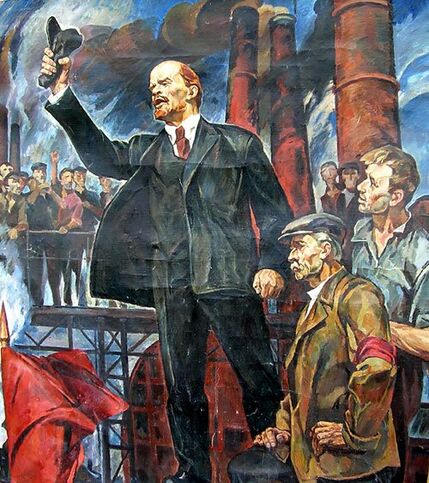Leftism: Difference between revisions
RedParabola (talk | contribs) mNo edit summary |
RedParabola (talk | contribs) (Added sections and image) |
||
| Line 1: | Line 1: | ||
[[File:Lenin gosr painting.jpg|thumb|483x483px|Painting of [[Vladimir Lenin]], a major left-wing revolutionary.]] | |||
'''Left-wing politics''', also known as '''leftism''', is a broad grouping of ideological tendencies which seek to alter and advance past the given socio-economic and political status quo in favor of a more egalitarian arrangement. In a modern context, leftist politics centers around the abolition of [[capitalism]] in favor of [[socialism]] and [[Communism (mode of production)|communism]]. Modern leftists also oppose the ideological forces in support of capitalism, including [[liberalism]] and [[fascism]]. | '''Left-wing politics''', also known as '''leftism''', is a broad grouping of ideological tendencies which seek to alter and advance past the given socio-economic and political status quo in favor of a more egalitarian arrangement. In a modern context, leftist politics centers around the abolition of [[capitalism]] in favor of [[socialism]] and [[Communism (mode of production)|communism]]. Modern leftists also oppose the ideological forces in support of capitalism, including [[liberalism]] and [[fascism]]. | ||
Common left-wing tendencies include [[Marxism]], [[anarchism]], [[Reformism|reformist]] or [[democratic socialism]], and the various sub-groupings in those trends. | Common left-wing tendencies include [[Marxism]], [[anarchism]], [[Reformism|reformist]] or [[democratic socialism]], and the various sub-groupings in those trends. | ||
== | == Etymology== | ||
The terms ''left-wing'' and ''leftism'' are derived from the [[French Revolution]], when the more progressive, egalitarian political factions were seated on the left-side of the assembly whereas the reactionary factions sat on the right-wing.<ref>[[wikt:left-wing|"left-wing"]] ''Wiktionary''</ref> | |||
* [[Left-unity]] | ==Issues== | ||
* [[United front]] | |||
===State verses anarchy=== | |||
A common point of division between leftists is towards the question of a revolutionary state. Most Marxists, particularly [[Marxism–Leninism|Marxist–Leninists]] and [[Marxism–Leninism–Maoism|Maoists]], argue it is necessary to create a [[Dictatorship of the proletariat|revolutionary dictatorship of the proletariat]] following the revolution to maintain the gains of the [[working class]], fight class enemies, etc. Anarchists and other [[Libertarian socialism|libertarian socialists]] on the other hand believe that creating a state in any form, socialist or not, will lead to the leaders of that state growing as corrupt as the bourgeois government preceding it, which will reproduce capitalist society. Therefore, from an anarchist perspective, [[statelessness]] is the most liberative form of political organization.<ref>[http://bse.sci-lib.com/article055028.html "Anarchism" (In Russian)] ''Great Soviet Encyclopedia'' </ref> | |||
===Revolution verses reformism=== | |||
{{Main|Reform versus revolution}} | |||
{{Empty section|date=March 2024}} | |||
===Vanguardism verses spontaneity=== | |||
{{Empty section|date=March 2024}} | |||
===Markets verses planning=== | |||
{{Empty section|date=March 2024}} | |||
==See also== | |||
*[[Left-unity]] | |||
*[[United front]] | |||
==References== | |||
<references /> | |||
{{Stub}} | {{Stub}} | ||
[[Category:Leftism]] | [[Category:Leftism]] | ||
Revision as of 21:57, 29 March 2024

Left-wing politics, also known as leftism, is a broad grouping of ideological tendencies which seek to alter and advance past the given socio-economic and political status quo in favor of a more egalitarian arrangement. In a modern context, leftist politics centers around the abolition of capitalism in favor of socialism and communism. Modern leftists also oppose the ideological forces in support of capitalism, including liberalism and fascism.
Common left-wing tendencies include Marxism, anarchism, reformist or democratic socialism, and the various sub-groupings in those trends.
Etymology
The terms left-wing and leftism are derived from the French Revolution, when the more progressive, egalitarian political factions were seated on the left-side of the assembly whereas the reactionary factions sat on the right-wing.[1]
Issues
State verses anarchy
A common point of division between leftists is towards the question of a revolutionary state. Most Marxists, particularly Marxist–Leninists and Maoists, argue it is necessary to create a revolutionary dictatorship of the proletariat following the revolution to maintain the gains of the working class, fight class enemies, etc. Anarchists and other libertarian socialists on the other hand believe that creating a state in any form, socialist or not, will lead to the leaders of that state growing as corrupt as the bourgeois government preceding it, which will reproduce capitalist society. Therefore, from an anarchist perspective, statelessness is the most liberative form of political organization.[2]
Revolution verses reformism
This section is empty. You can help by adding to it. |
Vanguardism verses spontaneity
This section is empty. You can help by adding to it. |
Markets verses planning
This section is empty. You can help by adding to it. |
See also
References
- ↑ "left-wing" Wiktionary
- ↑ "Anarchism" (In Russian) Great Soviet Encyclopedia